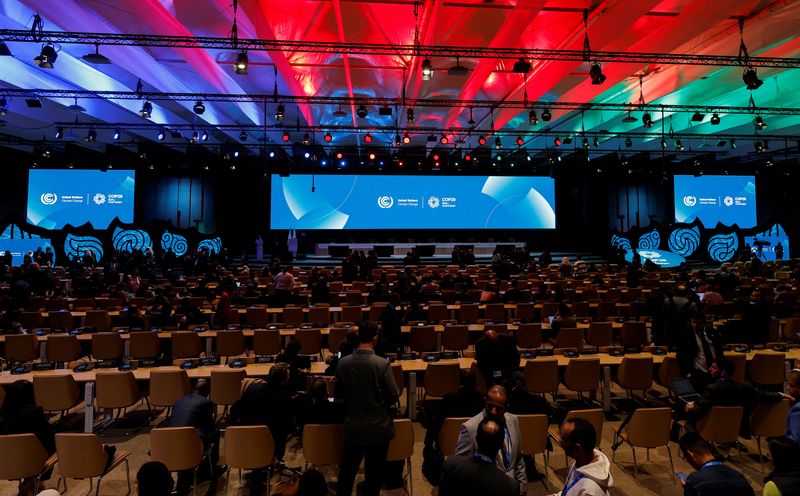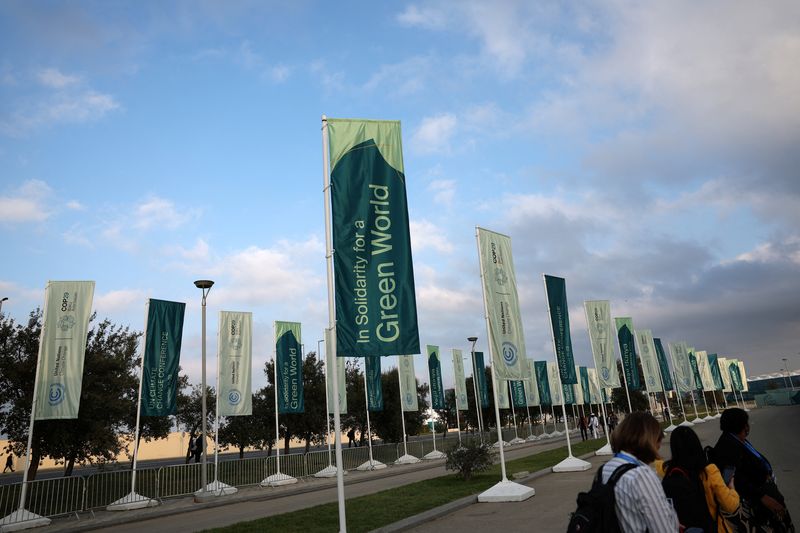By Valerie Volcovici and Nailia Bagirova
BAKU (Reuters) - The annual U.N. climate summit kicks off Monday (NASDAQ:MNDY) with countries readying for tough talks on finance and trade, following a year of weather disasters that have emboldened developing countries in their demands for climate cash.
Delegates gathering in Azerbaijan's capital of Baku are hoping to resolve the summit's top agenda item – a deal for up to $1 trillion in annual climate finance for developing countries.
The summit's negotiating priorities, however, are competing for governments' resources and attention against economic concerns, wars in Ukraine and Gaza and last week's U.S. re-election of Donald Trump, a climate-change denier, as president of the world's biggest economy.
COP29 host Azerbaijan will be tasked with keeping countries focused on agreeing to a new global finance target to replace the current $100 billion pledge expiring this year.
The Caspian Sea nation, often proud of being home to the world's first oil wells, will also be under pressure to show progress from last year's COP28 pledge to transition away from fossil fuels.
The country's oil and gas revenues accounted for 35% of its economy in 2023, down from 50% two years prior. The government says these revenues will continue to decline, to roughly 32% of its GDP this year and 22% by 2028.
Before the summit talks can even begin, countries will need to agree on an agenda by consensus – including an 11th-hour proposal by China to bring trade disputes into the mix.
The Chinese proposal - made on behalf of the fast-developing "BASIC" group of countries including Brazil, India and South Africa - asked for the summit to address "restrictive trade measures" such as the EU's carbon border tariffs going into effect in 2026.
Those concerns have been compounded by Trump's campaign promise to impose 20% tariffs on all foreign goods – and 60% on Chinese goods.
China's request showed it was flexing power following Trump's re-election, which signaled the United States' likely disengagement from global climate cooperation, said Li Shuo, director of China Climate Hub at the Asia Society Policy Institute.
Trump has called climate change a hoax and vowed to withdraw the U.S. from the Paris Agreement, the global treaty to reduce planet-warming emissions.
The European Union, along with current U.S. President Joe Biden's administration, have been pressing China and Gulf oil nations to join the pool of climate finance donor countries.
"If the EU wants to talk about climate finance with China, if it wants to talk NDCs, part of the conversation should be how to resolve our differences on trade and your tariffs," Shuo said.
EXTREME PRESSURE
With this year on track to be the hottest on record, experts noted that climate extremes were now challenging rich and poor countries alike – from flooding disasters in Africa, coastal Spain and the U.S. state of North Carolina, to drought gripping South America, Mexico and the U.S. West.
Most countries are not prepared.
"Election results don't alter the laws of physics," said Kaveh Guilanpour, vice president for international strategies at the nonprofit Center for Climate and Energy Solutions.
"Unless the world collectively steps up its efforts, the impacts of climate change will become increasingly severe and frequent and will be felt by an increasing number of people in all countries, including in the United States."
Many in Baku were worried that a U.S. disengagement could lead other countries to backpedal on past climate pledges or to scale back future ambitions.
"That is definitely a risk. People will be saying, well, the U.S. is the second biggest emitter. It's the biggest economy in the world ... If they don't set themselves an ambitious target, why would we?" Marc Vanheukelen, the EU's climate ambassador from 2019 to 2023, told Reuters.
GIFT OF GAS
Azerbaijan has spent the last year lobbying governments to accelerate their move to clean energy while touting gas as a transition fuel.
With Azeri President Ilham Aliyev having called its fossil fuel bounty "a gift of God," Azerbaijan has proposed creating a Climate Finance Action (WA:ACT) Fund to collect voluntarily up to $1 billion from extractive companies across 10 countries including Azerbaijan.
This year, the country's gas exports to Europe are expected to exceed 12 billion cubic meters, up from 11.8 billion cubic meters last year, as Europe seeks to reduce its reliance on Russian gas.
The country's chief COP29 negotiator, Deputy Foreign Minister Yalchin Rafiyev, said gas remained a key part of the energy mix for countries with limited alternatives.
"In this context, we must intensify our efforts to align natural gas usage with greenhouse gas reduction goals," Yalchin told Reuters.
Environmental groups and climate scientists have criticised the promotion of gas as a clean energy option, noting that it is a climate-polluting fossil fuel.
Presidential aide Hikmet Hajiyev said that, with its buildup of renewables, Azerbaijan was "moving from fossil fuel exports to green electricity exports." The country aims to have renewable energy fueling 35% of its power plant capacity by 2030. Last year, this figure was about 20%.

Azerbaijan also has fought criticism for its jailing political prisoners including journalists, and ethnic Armenians that Azerbaijan describes as separatist leaders.
Azerbaijan's Aliyev has rejected the criticism and warned that it could undermine the fragile peace negotiations between the two former Soviet republics.
